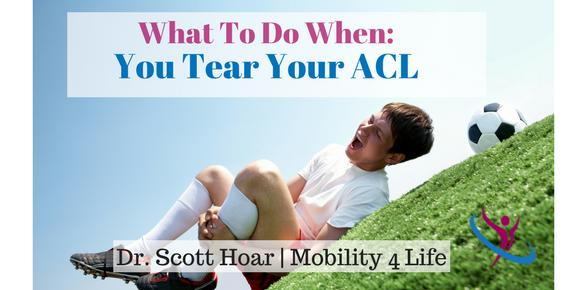
The torn Anterior Cruciate Ligament (ACL). One of the more famous and more devastating sporting injuries out there. The ACL's job is to stabilize the knee and prevent excessive front to back and side to side motion of the shin bone (tibia) over the thigh bone (femur). Athletes know, you're instantly 'out for the season' if this ever happens to you. But what if you're not a professional athlete? How should you handle such an injury? Let's discuss:
Surgery vs. No Surgery
You can absolutely live your life without surgically repairing your ACL. It depends on your lifestyle goals. If you want to play basketball again, to ski again, to dance again, to play soccer gain - schedule your surgery. If there's no point in delaying it. You just want to get it done. If you're the sort of person that has no interest in those activities and you want to avoid the surgery, you can do it. You'll want to keep in mind that without the ACL, you will be prone to having more inappropriate excessive movement of the knee, which will speed up the process of degeneration and eventually arthritis. I treat plenty of patients that decided never to get the surgery. While they can still be very active, you certainly wouldn't call them 'agile'. If it was me, I'd get the surgery.
Which Graft Should You Use?
When talking to your surgeon, ask what graft they will use. The graft is the name of whatever tissue they decide to replace the torn ACL with. You have multiple choices. My favorite ACL replacement is to use an allograft, aka a cadaever ACL. I don't like it when the surgeons use the patellar tendon or hamstring. I feel like there's creating two injuries vs. one. There's typically scar tissues which will interfere with proper knee flexibility in the patellar tendon graft.
How to Know if You've Torn Your ACL
The vast majority of torn ACL's are pretty obvious. There was probably some specific trauma to the knee that led to a loud 'pop' and a great deal of pain. Your inability to walk will have you seeking medical attention quickly. However, that's not all the causes. There are absolutely times when people suffer this injury without a large pop and proceeding crumble of the body. Sometimes it just feels like a 'tweek' deep in the knee and you can tell 'something's off'. These are the not so obvious instances. Sometimes it's a non-contact injury. Women in particular, are more prone to such injuries because they have wider hips, leading to an increased angle of stress on knee ligaments.
If you feel you might have injured your ACL and medical professional can help you by performing orthopedic tests on your knee. However, the gold standard currently is an MRI. It's important to know, however, that these are not 100% full proof. It's not unheard of where an orthopedic surgeon will perform a procedure on your knee and during the surgery they find more extensive damage to the knee then the MRI had shown previously. False positives and false negative do occur.
Chiropractic Exercises To Start On Now
So whether you've decided to get the surgery, or not, you'll want to start improving the stability of your core/hip/knee. Get good at the following exercises as they will increase your stability and control of your core and hip which will decrease excessive, injurious movement in the knee. I'd recommend getting started right away with these. Make sure you only perform these motions pain-free. You should start with easier versions of these exercises then progress to the more difficult ones.
- Glute Bridges
- Cross Crawl/Bird Dog
- Side Planks
- Kneeling Chops and Lifts
For all of these exercises, perform on both sides. You want (as close to) symmetry (as possible). That how you rate your effectiveness is it as good on the left as it is on the right. For glute bridges, you primarily strengthen the ability of the hip to extend with a neutral core/spine. 2 sets of 10 repetitions. You will strengthen the knee muscles as well as a by-product. It's less about knee range of motion and more about core/hip/knee stability. If you learn to effectively perform these exercises, you'll go a long way into a proper prep (or recovery) from a torn ACL. Good luck and please leave a comment below.